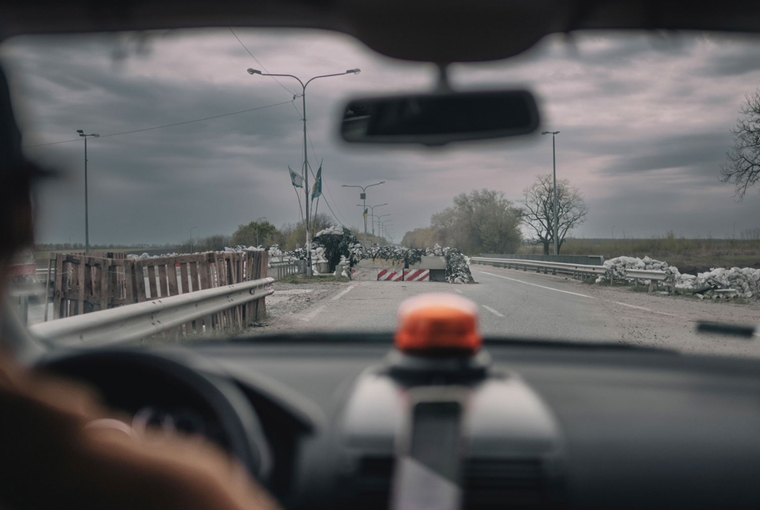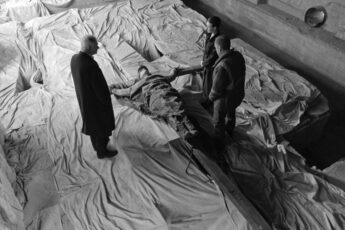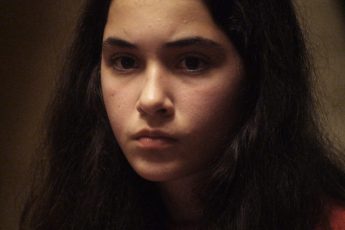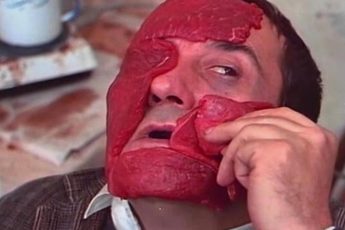Wheels of Rescue
Maciek Hamela’s In the Rearview (Skąd dokąd, 2023)
Vol. 141 (January 2024) by Martin Kudláč
War reporting takes on a distinct form within the documentary genre. Despite the 24-hour news cycle’s bombardment with images of destruction, political movements, and casualty counts, its reports often only skim the surface of the events and their deeper impacts. The Russo-Ukrainian war, a subject of numerous documentaries, has been notably captured in 20 Days in Mariupol, which took home the Best Documentary Feature Film award at the 96th Academy Awards.
Polish filmmaker Maciek Hamela delves into the human cost of the Ukraine conflict in his first full-length documentary In the Rearview. His unique approach involves documenting the war from the interior of a van, driving tens of thousands of kilometers through the war-torn region over a six-month span. Hamela offers viewers an immersive, wide-ranging war road trip that navigates through landscapes devastated by conflict and displacement. The film has received critical acclaim, screening in Cannes’ parallel ACID program and receiving awards at Warsaw’s Docs Against Gravity and Sheffield DocFest.
Born in Poland during the 1980s, Maciek Hamela, who chose to learn Russian out of interest rather than necessity, feels a profound connection to Ukraine’s plight. This bond is evident throughout his film as he provides a raw and unfiltered glimpse into the human impact of conflict, setting his work apart from other war documentaries given its close-up portrayal of Ukrainian civilians fleeing war. By assuming the dual responsibilities of a volunteer assisting in the evacuation and a filmmaker, the director manages to capture both testimonies and the bare emotions of individuals impacted by war.
Hamela crafts his narrative within the confined space of a volunteer aid van through a series of vignettes. This setting morphs into a sanctuary of temporary relief and hope, where refugees share their personal accounts, fears, and aspirations, weaving a collective portrait of their quest for safety. Hamela exercises restraint in his filmmaking approach, choosing to spotlight the quieter, more introspective moments of those impacted by the conflict, rather than the dramatic violence typically associated with war documentaries. His focus remains squarely on the personal experiences of civilians, delving into the complexities of tough decisions, separated families, and the uncertainty of what lies ahead.
Hamela, who drives the van himself throughout the film, maneuvering through damaged roads and coordinating the logistics of picking up and dropping off refugees, employs a filming technique that aims to minimally intrude on the lives of his passengers. This approach, reminiscent of and refined from methods used in productions like Taxicab Confessions, relies predominantly on long takes from a fixed central camera. The camera angles are adjusted when necessary, for instance to capture views of devastated cities, and additional footage is shot outside the van to complement the narrative. This methodological choice enhances the intimacy of the film already implicit in the claustrophobic setting.
By shifting the focus entirely onto the human dimension of conflict, In the Rearview deliberately puts aside political and military contextualization. Conversations within the van – often involving mothers and their children – range from the everyday to the profound, interspersed occasionally with moments of humor. A particularly tense episode involves transporting a Congolese woman in urgent need of medical attention, adding another layer of drama to the narrative.
The documentary extends its scope beyond the immediate ramifications of conflict to delve into the long-lasting psychological, social, and civilizational consequences of war. In the Rearview not only chronicles the journeys of refugees and the solidarity demonstrated by Poles in supporting their Ukrainian neighbors, but also serves as a poignant tribute to human resilience and fortitude amid the ravages of war. Through its close-up view of the refugee experience and Maciek Hamela’s empathic filmmaking, the film invites audiences to reflect on both the direct and the lingering effects of conflict. It captures a pivotal moment in the ongoing Ukrainian crisis, contributing to a deeper comprehension of the extensive human toll exacted by war.
The documentary excels in bringing a personal dimension to the migration narrative, moving beyond impersonal statistics to reveal the faces, stories, dreams, and fears of those displaced by conflict. This effort to humanize the experience of refugees is essential in countering the tendency to diminish their struggles to mere political debate. Hamela’s In the Rearview offers an intimate, powerful insight into the human toll exacted by warfare. Opting against dramatic battle scenes, the film adopts a more subtle, human-focused lens, providing not just a vivid account of the conflict in Ukraine but also celebrating the indomitable resilience of the human spirit when faced with hardship.




Leave a Comment